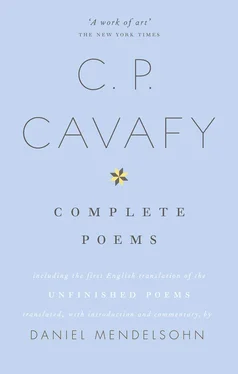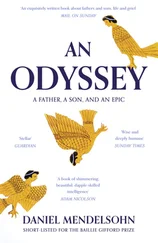1 ...8 9 10 12 13 14 ...27 The second crucial aspect of Cavafy’s prosody is rhyme. The well-intentioned Forster couldn’t have been more wrong when, in introducing the Alexandrian’s poems to his British audience, he claimed that “they are all short poems, and unrhymed.” The great majority of Cavafy’s youthful output of the late 1880s and throughout the 1890s was strictly rhymed; many of those poems, as I have mentioned, are cast as sonnets (most as Italian sonnets), and adhere closely to all of the conventions of that form. Although it is true that as Cavafy matured his verse became freer, he continued to employ rhyme to potent effect for the rest of his career. Examples from three poems—one from the 1890s, another from the early 1910s (which is to say, after the Philosophical Scrutiny, the moment when the poet stood on the threshold of his mature work) as well as a very late one—show how important this device remained for him from the beginning to the end of his career.
“Walls,” a crucial early poem written in 1896 and published the following year, combines, with a marvelous complexity and subtlety, two crucial aspects of Cavafy’s technique: his early penchant for strict rhyme, and his pointed manipulation of tensions between katharevousa and demotic. It consists of eight lines, rhymed a-b-a-b-c-d-c-d:
Without pity, without shame, without consideration
they’ve built around me enormous, towering walls.
And I sit here now in growing desperation.
This fate consumes my mind, I think of nothing else:
because I had so many things to do out there.
O while they built the walls, why didn’t I look out?
But no noise, no sound from the builders did I hear.
Imperceptibly they’ve shut me from the world without.
The rhymes (which in Greek are strictly homophonous) effectively convey the prisonlike feeling of being locked in; and indeed the poet listed this poem under the thematic heading “Prisons.” But there is far more going on here. For in the case of each set of rhymes but one, the first rhymed word is katharevousa, while the second is demotic, or is at least neutral: hence, for example, line 1 (literally, “without consideration, without pity, without shame”) ends with the katharevousa word  , “shame,” which is pronounced ehdhó, while line 3 (literally, “And I sit and lose all hope now here”) ends with the demotic word , “here,” which has the identical pronunciation. In the first two couplets, moreover, the katharevousa usages are associated with the oppressive “them” ( without shame, walls ), while the demotic usages are associated with the imprisoned “I” ( here, this fate ). The only pairing in which the rhymed words are both in the demotic is that of lines 6 and 8.The former (literally, “O while they built the walls, how could I not pay attention?”) ends with the verb proséxo, “pay attention”—but to the Greek ear, the word is indistinguishable from the prepositional phrase pros éxo, “towards the outside”: which is to say, the very direction in which the speaker failed to look. (To the Greek ear, it sounds as if the line is going to be something like, “O while they built the walls, why didn’t I look towards the outside?”) In my translation I have tried to convey this provocative confusion by translating the first word by means of the casual English expression “look out,” which has the further advantage of enabling the loaded repetition, which we find in the Greek, of the word “out.”
, “shame,” which is pronounced ehdhó, while line 3 (literally, “And I sit and lose all hope now here”) ends with the demotic word , “here,” which has the identical pronunciation. In the first two couplets, moreover, the katharevousa usages are associated with the oppressive “them” ( without shame, walls ), while the demotic usages are associated with the imprisoned “I” ( here, this fate ). The only pairing in which the rhymed words are both in the demotic is that of lines 6 and 8.The former (literally, “O while they built the walls, how could I not pay attention?”) ends with the verb proséxo, “pay attention”—but to the Greek ear, the word is indistinguishable from the prepositional phrase pros éxo, “towards the outside”: which is to say, the very direction in which the speaker failed to look. (To the Greek ear, it sounds as if the line is going to be something like, “O while they built the walls, why didn’t I look towards the outside?”) In my translation I have tried to convey this provocative confusion by translating the first word by means of the casual English expression “look out,” which has the further advantage of enabling the loaded repetition, which we find in the Greek, of the word “out.”
Similarly, the two eight-line stanzas that make up “The City,” which Cavafy published in 1910 after fifteen years of constant revision of an earlier version, and which he selected as the opening poem for his 1905–15 collection (and which is, therefore, the first of his poems that his readers encounter), follow a strict rhyme scheme, in this case a-b-b-c-c-d-d-a. Here, as before, he employs a strict homophonous end-rhyme to hammer home a crucial point. The first stanza provides a useful example:
You said: “I’ll go to some other land, I’ll go to some other sea.
There’s bound to be another city that’s better by far.
My every effort has been ill-fated from the start;
my heart—like something dead—lies buried away;
How long will my mind endure this slow decay?
Wherever I look, wherever I cast my eyes,
I see all round me the black rubble of my life
where I’ve spent so many ruined and wasted years.”
In line 4 a desperately frustrated youth describes his heart as something that, like a corpse, lies “buried” ( thaméni, the last word in the line in the original), and in the following line he asks, with great anguish, how long his mind will remain in a state of stagnation; the sound of the last words of this line in the Greek, tha méni, “will remain,” are indistinguishable from those of thaméni, inextricably linking the boy’s abject feeling of being buried alive to a predicament that is indeed desperate. For as we learn, he will in fact remain in Alexandria for the rest of his life, imprisoned by a hopeless, soul-destroying drudgery. The return in each stanza’s final line to the rhyme with which the stanza begins ( khalassa, “wasted”/ thalassa, “sea”) is, moreover, itself indicative of the way in which the boy is trapped, doomed always to return to “the same place.” There is no forward motion in the rhymes, as there is no forward motion in his life.
In the late poem “Days of 1908,” to recur to a by-now-familiar example of so many of Cavafy’s most characteristic themes and techniques, rhyme is similarly used to great effect. The first three lines, for instance, quickly sketch a portrait of the dire economic position of the beautiful young man whom the narrator will later see naked on the beach:
Ton khróno ekeínon vréthike khorís dhouliá
That year he found himself without a job;
ke sinepós zoúsen ap’ ta khartiá
and so he made a living from cards,
apó to távli, ké ta daneiká.
from backgammon, and what he borrowed.
The triple repetition of accented final syllables ending in a short a, which I have attempted to mimic here, conveys the dreary monotony of the boy’s endless quest for money. The conclusion of the poem shows a similar interest in exploiting the potential of rhyme. The two penultimate stanzas are composed of three lines each, the sequence of end-rhymes in the first repeated by that in the second:
His clothes were in a dreadful state.
There was one suit that he would always wear,
a suit of a very faded cinnamon hue.
Oh days of the summer of nineteen hundred eight,
your vision, quite exquisitely, was spared
that very faded cinnamon-colored suit.
But here, the similarity in sound is pointedly belied by a crucial difference in sense. The first of these two stanzas describes the shabby state of the boy’s clothes, as observed by the poet, while the second declares that Time itself (the apostrophized “days of 1908”) has been spared the sight of that ugliness—and will, as we learn in the final stanza, already quoted above, redeem the boy’s tawdry circumstances by preserving forever the vision of his beauty once it has been stripped of the dreadful clothes.
As these few examples will indicate, a primary concern of the present translation is to try—as much as possible, and without contorting the English—to convey this vital element of Cavafian prosody. As these examples also show, I have made use of off-rhymes, assonance, consonance, and slant-rhymes when strict rhymes were difficult to achieve in English, in the belief that readers should be able to feel the formal elements of Cavafy’s verse whenever possible.
Читать дальше

 , “shame,” which is pronounced ehdhó, while line 3 (literally, “And I sit and lose all hope now here”) ends with the demotic word , “here,” which has the identical pronunciation. In the first two couplets, moreover, the katharevousa usages are associated with the oppressive “them” ( without shame, walls ), while the demotic usages are associated with the imprisoned “I” ( here, this fate ). The only pairing in which the rhymed words are both in the demotic is that of lines 6 and 8.The former (literally, “O while they built the walls, how could I not pay attention?”) ends with the verb proséxo, “pay attention”—but to the Greek ear, the word is indistinguishable from the prepositional phrase pros éxo, “towards the outside”: which is to say, the very direction in which the speaker failed to look. (To the Greek ear, it sounds as if the line is going to be something like, “O while they built the walls, why didn’t I look towards the outside?”) In my translation I have tried to convey this provocative confusion by translating the first word by means of the casual English expression “look out,” which has the further advantage of enabling the loaded repetition, which we find in the Greek, of the word “out.”
, “shame,” which is pronounced ehdhó, while line 3 (literally, “And I sit and lose all hope now here”) ends with the demotic word , “here,” which has the identical pronunciation. In the first two couplets, moreover, the katharevousa usages are associated with the oppressive “them” ( without shame, walls ), while the demotic usages are associated with the imprisoned “I” ( here, this fate ). The only pairing in which the rhymed words are both in the demotic is that of lines 6 and 8.The former (literally, “O while they built the walls, how could I not pay attention?”) ends with the verb proséxo, “pay attention”—but to the Greek ear, the word is indistinguishable from the prepositional phrase pros éxo, “towards the outside”: which is to say, the very direction in which the speaker failed to look. (To the Greek ear, it sounds as if the line is going to be something like, “O while they built the walls, why didn’t I look towards the outside?”) In my translation I have tried to convey this provocative confusion by translating the first word by means of the casual English expression “look out,” which has the further advantage of enabling the loaded repetition, which we find in the Greek, of the word “out.”










